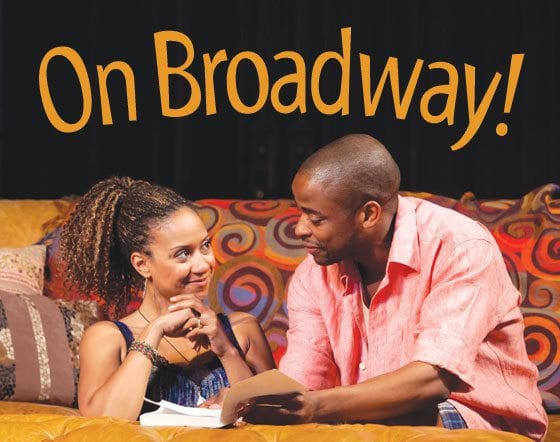
Lydia R. Diamond’s enduring ‘Stick Fly’ makes its New York debut
Transplanted from Boston’s Huntington Theatre Company to Broadway, Lydia R. Diamond’s irresistible play “Stick Fly” now presides at the Cort Theater in New York City, where it looks set to remain for a long run.
An African American playwright, Diamond, 42, has found a nurturing home for her talents in Boston, since she and her family moved here from Chicago seven years ago.
While teaching at the School of Theatre in Boston University’s College of Fine Arts, Diamond continues writing and working with theater companies eager to perform her plays. Boston’s Company One produced two and Cambridge’s Underground Railway Theater staged a third. In 2006, while she was a Playwriting Fellow at the Huntington Theatre, her new play “Stick Fly” caught the attention of a frequent Huntington collaborator, the distinguished African American director Kenny Leon.
In 2010, Leon directed a joint production of “Stick Fly” by the Huntington and Washington D.C.’s Arena Stage. Diamond’s play, a comedy of manners focused on a weekend gathering of an upper-class black family on Martha’s Vineyard, enjoyed an extended, sold-out run at the Huntington Theatre Company.
Now its Broadway premiere, also directed by Leon, is introducing new audiences to Diamond’s fast-paced, funny and smart portrayal of the privileged but flawed LeVay family.
The patriarch, Joe, a neurosurgeon, arrives at the family’s sumptuous island home without his wife. Joining him are his sons Kent, an aspiring novelist, and Flip, a plastic surgeon.
Here to meet the family are Taylor, Kent’s eager-to-please fiancé, and Flip’s girlfriend, Kimber. The sole Caucasian in the group, Kimber is a self-described WASP who teaches black students in an inner-city school. Also on hand is Cheryl, filling in for her mother, the live-in maid, who is also conspicuously absent this weekend. As well schooled as the LeVay men and their women, Cheryl is a scholarship student at a top prep school who is contemplating Princeton as her next destination.
The play takes its curious title from Taylor’s technique for studying bugs. An entomologist, she examines an insect by gluing it onto a stick and observing how it works.
Similarly, Diamond’s play examines the workings of this hyper-articulate, highly educated group, whose rapid-fire, witty exchanges barely conceal their growing pains.
Seamlessly merging form and content, Diamond adopts a traditional drawing room comedy, a vehicle used by the likes of George Bernard Shaw to satirize the British upper classes, and portrays an affluent African American family.
The set by David Gallo, also scenic designer of the Boston production, embodies the dual pulls of the LeVay family between old-world pedigree and a lighter, freer spirit. One part of the jagged hybrid structure that fills the stage is a drawing room with palatial chandeliers, grand inlaid ceilings, walls of books and, arranged with impeccable taste, art works by important African American modernists such as Romare Bearden and Jacob Lawrence. Adjoining this dark, baronial chamber is a contemporary kitchen and veranda open to the sun and sky.
True to its genre, the play is animated by witty banter and parlor games that cover for ploys, jabs of one-upmanship and domestic jousts of other kinds.
The LeVays and their women play Scrabble as they flaunt their wit. And they also play a deeper game, with higher stakes. Despite their education, gifts and accomplishments, they come to see how near or far they are from a more elusive prize — love and its demands and rewards.
Despite a contrived, soapy plot and an overdose of cleverness, the play is never less than entertaining and bristles with honesty about the currencies of race, class, education and money. Most satisfying of all, the actors ably mine the personalities of their characters.
Dulé Hill (“The West Wing”) plays Kent, Diamond’s idealized nice guy, who withstands his father’s disdain as he strives to become his own man. Stiff at first, Hill gains warmth and conviction in the course of the play.
As a father who talks a good game, Ruben Santiago-Hudson transmits his character’s dual currents of chill and charm. The son in his image, Flip (Mekhi Phifer) at times talks and behaves like a jerk. Yet without abandoning his character’s cool assurance, Phifer shows Flip is not too old to grow up.
Reprising her role in the Boston production, Rosie Benton is the elegant and sophisticated Kimber. Flip’s match in self possession, she too has her moment of vulnerability.
Tracie Thoms is funny, tough and cute as the overwrought, yearning Taylor. Yet like her character, who rarely lets up, she over-performs her role.
As Cheryl, Condola Rashad appears to be having the most fun on stage. She plays her part as the group’s maid and peer with droll restraint. And she gets some of the best lines. Speaking of Taylor, Cheryl tells Kent, “Tell her not to try so hard.”
Fed up with her houseful of charges, she says, “… you don’t think ‘bout nothin’ but yourselves and your damn socioeconomic bantering, and bugs, and relationship dysfunction …”
Later, as she absorbs a shattering revelation, Cheryl says, “I’m thinkin’ I don’t like Taylor ‘cause she trying so hard to be seen. But I don’t like her ‘cause she like me … I deserve to be seen.”
So does this play. If you missed it at the Huntington, see it in New York.






